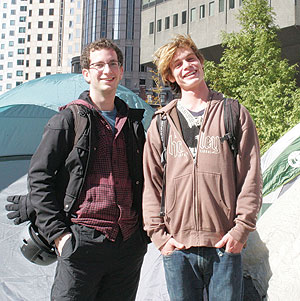
Representing the 99 percentile, occupation has come to Boston and the numbers keep rising. - Photo by Andrew Firestone
By Andrew Firestone
Occupy Boston has attracted some Somervilliens it seems. With little glamor, or glory, these young people camp out in tents out by South Station in Downtown Boston. They claim to fight for the “99 percent” or the percentage of the country they rally around who receive exponentially less wealth than the top one percent.
Weathermen they may not be. No 1960s flair for the dramatic, or violent tendencies. They come with friends, and sit in tents, and ask for only one thing, fairness in the financial sector dealings of the federal government.
“This early in a movement, it’s hard to pin down a specific set of demands or an exact platform, and that’s what a lot of people want you to do,” said Harvard Divinity student and Somervillien Robin Lutjohann.
And students they are, many. They come by the dozens, many of them un-or-underemployed 20-something professionals, unemployed men and women in their ‘30s and ‘40s. Their town of tents includes a medical center and daily yoga classes.
“I’m one of the 99 percent,” said Somervillien Jess Guerriero, a Simmons College social work student. “I’m privileged enough to be able to get an education, but I’ll be leaving with almost $200,000 in student loan debt.”
Some are only in their late teens, and eager to join the cause.
“We are not part of the 99 percent,” said Tufts student organizer Sam Newland. “Everybody is a citizen,” continued Emil Cliggot-Perit, his comrade. “Citizens have obligations towards the betterment of the country, towards the public good and helping everybody out.”
They number in the thousands, holding protests and marches. They occupy parks and busy streets. They seem to have a number of backgrounds. But they all fundamentally believe one thing: the division of wealth in the country has become too great, and it’s time to stop siphoning money from those who have none.
“The most obvious [reason I’m with Occupy Boston],” said Lutjohann. “I’m Christian. We are commanded to have, what deferential theologians would call, a preference for the poor.”
“We are supposed to there for the poor, we are supposed to be there for those who have less. If we have more, we’re supposed to reflect on wealth. We are supposed to not horde. We are supposed to be not be greedy,” he said.
“You fundamentally cannot act just on self-interest, because that is how, in a hierarchical democracy, people get corrupted,” said Cliggott-Perit.
The group staged a march on Monday, October 10, with numbers so great that the Boston Police department would not allow them to use the bridge to Charlestown. They arrested around 100 protesters, claiming that they were not allowed to occupy a park that had recently gone through expensive renovations.
Their lives are ones based on community. Guerriero works as a mental health worker at the medical tent. “These protests can be emotional,” she said. “Frankly, some people just – they haven’t been heard by larger systems in society, so they just need someone to talk to and really feel like their voice is being heard.”
Their main feeling, as voiced by Cliggot-Perit, seems to be a frank one indeed. “The political system seems to prefer, by and large, corporations over people, seems to give them more leeway, seems to cut them more lack with the laws,” he said.
“I think that’s unjust. It seems that money plays an inordinately large role, and the representation of the people gets left by the wayside,” he said.
The business people who work in the sector stop, and ask them about their cause. The camp is a veritable fair of activity during rush hour. The group has become iconic of the desperation felt by many, with a decidedly more open feel than previous “Tea Party” demonstrations. The group did, however, recently show support for accused terrorist Tarek Mehanna of Sudbury, who is accused of planning a terrorist attack.
The picture painted by the protesters from Somerville was not as radical. Said Guerriero, who hopes to get a job as a social worker. “The healthcare system is not great. I’m just really fed up and looking for this community support,” she said.
“It’s just amazing the way this thing has come together.”
Their protest continues.















Reader Comments